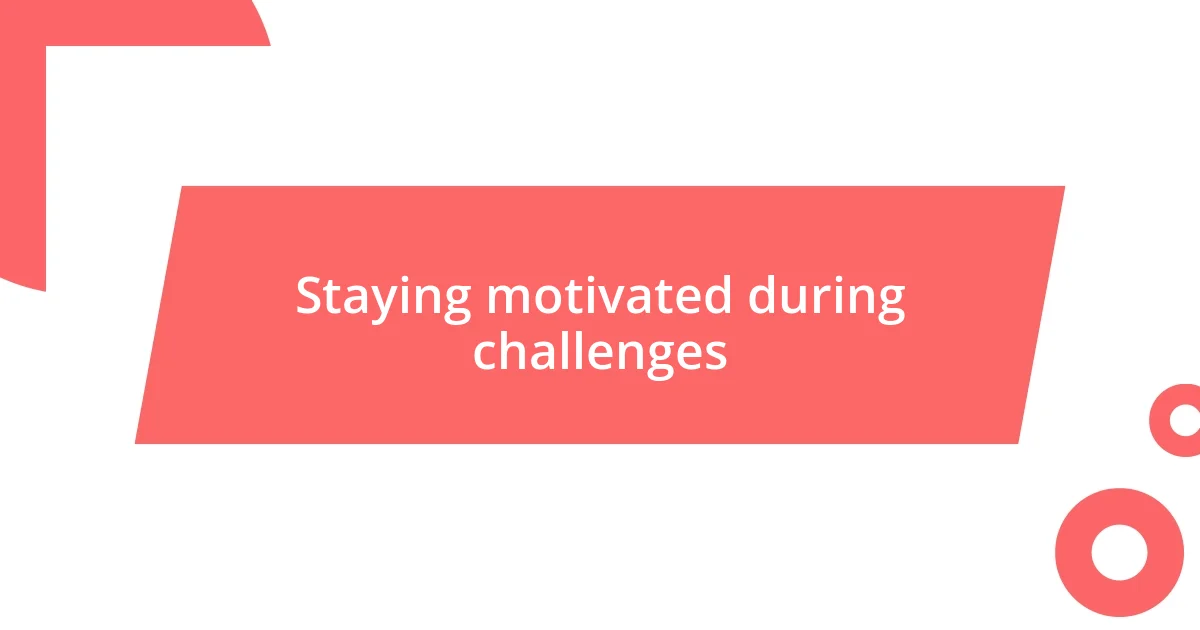Key takeaways:
- Fitness challenges foster personal growth, resilience, and a supportive community, transforming both physical and mental well-being.
- Setting realistic goals and tracking progress through small victories enhances motivation and makes fitness journeys more fulfilling.
- Overcoming obstacles requires a shift in perspective, effective time management, and confronting self-doubt to embrace personal growth and empowerment.

Understanding fitness challenges
Fitness challenges can be thrilling opportunities for personal growth. I remember participating in a local 30-day squat challenge; initially, the thought of doing 100 squats in a single day felt overwhelming. But as the days passed, I discovered a sense of accomplishment and even a community spirit among fellow participants, which kept me motivated.
When I think about the emotional rollercoaster that often accompanies fitness challenges, it’s fascinating to consider how they push us out of our comfort zones. Have you ever started a challenge feeling energized, only to later wrestle with self-doubt? I certainly did. The lows, like sore muscles and fatigue, often felt balanced by the highs of seeing tangible results, reminding me of why I began in the first place.
At their core, fitness challenges are a blend of physical and mental journeys. They teach us resilience, but have you ever wondered how much they reveal about ourselves? I’ve found that tackling challenges not only transforms my body but also reshapes my mindset, reinforcing that success comes from consistency and perseverance, both in fitness and in life.

Benefits of fitness challenges
Engaging in fitness challenges brings a myriad of benefits, each contributing to both mental and physical well-being. Personally, I noticed a massive boost in my motivation as I committed to a rigorous 21-day fitness challenge. Each day felt like a personal victory, and by the end, I was not just stronger physically but also more resilient emotionally. The rush of accomplishing daily goals provided a rush of endorphins that motivated me to push further.
Here are some specific benefits I’ve experienced and observed in others during fitness challenges:
- Goal-setting Clarity: Challenges provide specific, measurable goals that help clarify what we aim to achieve, making progress tangible.
- Community Connection: Joining a challenge often brings people together, fostering a sense of camaraderie and support that enhances motivation.
- Increased Accountability: When I commit to a challenge, I feel accountable not just to myself but to the group I’m participating with, which propels me to stay consistent.
- Skill Development: With each challenge, I often pick up new skills or refine existing ones—whether it’s better form, endurance, or new exercises.
- Celebration of Successes: Completing a challenge is rewarding, and each small win deserves recognition, reinforcing positive habits for the future.

Types of fitness challenges
Engaging in diverse fitness challenges can be a thrilling way to explore your capabilities and keep your routine fresh. From month-long cardio challenges to strength-focused boot camps, each type presents its own set of physical and mental hurdles. For instance, when I ventured into a 14-day plank challenge, I didn’t just work on my core strength; I also learned how discipline and tenacity can transform not just my body but my entire outlook on fitness. Isn’t it interesting how each type can cater to different goals and preferences?
There’s a distinction between team challenges and solo endeavors as well. Team challenges infuse a collaborative spirit, while solo challenges allow for personal introspection and growth at your own pace. I’ve participated in both, and I find the connection with teammates during a relay race brings an infectious energy that’s hard to replicate alone. However, there’s something special about that solo journey, where I confront my mental barriers head-on, pushing through those moments of doubt like a cherished rite of passage.
Lastly, variations like nutrition-based challenges offer a holistic approach to health, complementing physical activity with diet adjustments. I dived into a month of clean-eating, and alongside my workouts, the combination helped me understand the profound link between what fuel I put into my body and my overall performance. It’s intriguing how these challenges can intertwine different aspects of fitness, prompting a more comprehensive understanding of well-being.
| Type of Challenge | Description |
|---|---|
| Physical Challenges | Focus on endurance, strength, and stamina through actions like running, planking, or weightlifting. |
| Nutritional Challenges | Involves dietary changes, such as clean eating, meal prepping, or eliminating certain foods. |
| Team Challenges | Collaborative efforts that involve group activities, encouraging camaraderie and mutual motivation. |
| Solo Challenges | Personal quests where individuals set their own goals and track progress independently. |

Setting realistic goals
Setting realistic goals is crucial in any fitness journey. From my own experience, I’ve learned that setting achievable milestones leads to a more fulfilling and sustainable path. When I participated in a 30-day yoga challenge, I started by committing to just ten minutes each day. This not only set me up for success but also allowed me to gradually increase my practice without overwhelming myself.
Finding the sweet spot between challenge and attainability can make a world of difference. I remember when I first attempted to run a half-marathon. Initially, I thought I could jump straight into training without prior preparation. However, setting smaller goals—like running a mile without stopping—made the process less intimidating and more rewarding. Each time I reached that mile, I felt a surge of accomplishment that propelled me forward, fueling my desire to keep improving.
It’s fascinating how our limitations can sometimes become our greatest teachers. By setting realistic goals, I’ve learned to embrace setbacks as part of the journey. For example, after a frustrating week where I didn’t hit my workout targets, I re-evaluated my expectations. I realized that it was better to focus on consistency rather than perfection, allowing me to enjoy the process and celebrate progress, no matter how small. Have you ever found yourself in a similar situation? Adjusting my goals not only eased the pressure but transformed my mindset about fitness, reminding me that it’s a journey, not just a destination.

Staying motivated during challenges
Staying motivated during challenges is often the deciding factor between success and frustration. I vividly remember tackling a month-long hiking challenge; some days, the thought of steep trails and long distances felt daunting. However, I found that focusing on the joy of being outdoors and the thrill of discovering new vistas ignited a fire within me. How do you keep that spark alive when the going gets tough?
Another aspect that helps maintain motivation is a solid support network. When I signed up for a virtual cycling challenge, I was initially nervous about tackling the last few rides solo. But connecting with fellow participants through online forums created a sense of community that kept me accountable. We shared our ups and downs, cheered each other on, and I found myself pushing through my limits simply because I wanted to uplift others. Isn’t it amazing how the energy of a group can elevate individual efforts?
Lastly, finding little victories along the way can make the journey incredibly rewarding. During a month-long fitness challenge, I set up mini goals, such as increasing my plank time by a few seconds every week. Each small accomplishment was a reminder that progress doesn’t always have to be monumental to be meaningful. It’s those little wins that built my confidence over time, proving that persistence mixed with patience can create profound transformation. What small victories have you celebrated on your own fitness path?

Tracking your progress
Tracking your progress can feel like a game-changer in any fitness journey. I remember after finishing my 30-day yoga challenge, I started journaling my daily experiences. It wasn’t just about recording my time on the mat; it became a rich tapestry of my thoughts, frustrations, and triumphs, and this reflection deepened my connection with the practice. Have you ever tried writing down your journey? It helps to see how far you’ve come, even in ways you hadn’t anticipated.
One key method I’ve found effective is using fitness apps to log workouts and monitor trends over time. There was a point when I began tracking my running pace each week. Seeing my progress on a graph, I couldn’t help but feel a rush of motivation each time I noticed a drop in my time. It became a visual reminder that every step mattered, encouraging me to lace up my shoes even on the days I felt less inspired. Isn’t it fascinating how data can spark that extra bit of determination in us?
Moreover, celebrating those milestones, no matter how small, is essential. I distinctly remember hitting my 100th mile in a virtual walking challenge. I didn’t just check it off my list; I treated myself to a small reward—a cozy day at home with my favorite book. This acknowledgment not only instilled joy but reinforced the idea that progress deserves celebration, further motivating me to tackle the next challenge. Do you have strategies for rewarding yourself along your fitness journey? Keeping that spirit alive can truly elevate the experience.

Overcoming obstacles in fitness challenges
Obstacles can often feel monumental in fitness challenges, but I’ve learned that a shift in perspective can make all the difference. I remember facing a particularly challenging week during a strength training program when my usual routines felt like insurmountable tasks. Instead of succumbing to frustration, I approached those tough workouts as opportunities for growth. Have you ever reframed a difficult situation, only to find it empowers you instead?
Another barrier many face is time management. Juggling work, family, and self-care can sometimes make fitness feel like just another item on a never-ending to-do list. I recall a phase when I struggled to fit in my workouts amidst my busy schedule, but I found that breaking my sessions into bite-sized, 15-minute bursts made a world of difference. It transformed my perception of exercise from a chore into a series of mini-empowerments throughout my day. Isn’t it interesting how small adjustments can lead to significant changes in attitude?
Lastly, dealing with self-doubt is an obstacle that can creep in unexpectedly. While participating in a team obstacle course race, I initially compared myself to more experienced athletes and felt uneasy about my abilities. However, I reminded myself that everyone has their journey. Each challenge is a personal climb, and having the courage to show up, regardless of skill level, was the triumph I truly needed to recognize. How have you confronted your inner critic when pursuing fitness goals?













